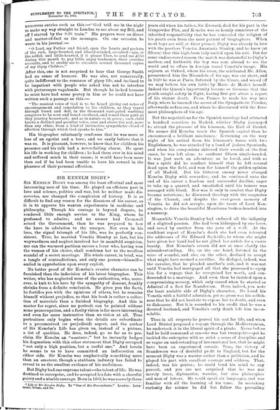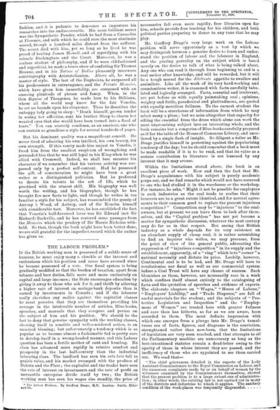SIR, KENELM DIGBY.* SIB KENELM DIGBY was among the least
effectual and most interesting men of his time. He played an officious part in love and science, politics and war, but he neither made dis- coveries, nor changed the complexion of history. It is as difficult to find any reason for the disasters of his career, as it is to approve his wanton experiments in medicine and philosophy. Though his courage is beyond dispute, he rendered little enough service to the King, whom he professed to admire ; and no sooner had Cromwell seized the Government, than he was prepared to bow the knee in adulation to the usurper. Not even in his love, the signal triumph of his life, was he perfectly con- sistent. True, he married Venetia Stanley at last, but his waywardness and neglect involved her in manifold suspicion, nor can the warmest partisan excuse a lover who, having won the woman of his choice, shall condemn her to the needless scandal of a secret marriage. His whole career, in brief, was a tangle of contradictions, and only one person—himself- smiled in approbation upon every exploit.
No better proof of Sir Kenelm's evasive character can be furnished than the indecision of his latest biographer. This writer, who has neglected none of the authorities, who, more- over, is knit to his hero by the sympathy of descent, frankly shrinks from a definite conclusion. He gives you the facts, he fortifies you with the opinions of others, but he remains himself without prejudice, so that his book is rather a collec- tion of materials than a finished biography. And this is matter for regret, since no portrait can be painted without some preoccupation, and a faulty vision is far more interesting and even far more instructive than no vision at all. True portraiture only begins when the details are subordinate to a preconceived (or prejudiced) aspect, and the author of Sir Kenelm's Life has given us, instead of a picture, a Eat of qualities. He does, indeed, go so far as to pro. claim Sir Kenelm an "amateur;" but he instantly hedges his dogmatism with this other statement that Digby occupied "not only a high position, but a useful one." And herein he seems to ns to have committed an indiscretion on either side. Sir Kenelm was emphatically something more than an amateur, though a stubborn industry has failed to reveal to us the smallest evidence of his usefulness.
But Digby bad one supreme talent—the talent of life. He was destined to enterprise, and be accepted his fate with a cheerful gaiety and a nimble courage. Born in 1603, he was scarcely three
• Life of Sir Kenelm Digby. By " One of His Descendants." London : Long- EMS, Green, and Co. years old when his father, Sir Everard, died for his part in the Gunpowder Plot, and Kenelm was so keenly conscious of the inherited responsibility that he has concealed the religion of his youth even from the most patient of biographers. When most boys are still at their primer, Digby was already in love with the peerless Venetia Anastasia Stanley, and he knew (at fifteen) that this high-born lady smiled upon his suit. But for some undiscovered reason the match was distasteful to Digby's mother, and forthwith the boy was sent abroad to see the world and to efface in foreign travel Venetia's image. His sojourn at Oxford, where his tutor, the celebrated Mr. Allen, pronounced him the Mirandola of his age, was cut short, and in 1620 he was at Paris, flattered by the Court, and wooed (if we may believe his own fable) by Marie de Medici herself. Indeed the Queen's importunity became so tiresome that the youth sought safety in flight, having first put about a report of his violent death. From France he made his way into Italy, where he learned the secret of the Sympathetic Powder, afterwards so famous, and where ho discoursed with the fore- most philosophers of his age.
But the negotiations for the Spanish marriage had attracted a hundred courtiers to Madrid, whither Digby journeyed to attend the pleasure of his kinsman, the Earl of Bristol. No sooner did Kenelm reach the Spanish capital than be encountered a brilliant mischance.- Returning on the very night of his arrival from his kinsman's house with two Englishmen, he was attacked by a band of jealous Spaniards, and when his companions shivered their swords at the first onset, he was left alone to confront fifteen single-handed. It was just such an adventure as he loved, and with so fine a spirit did he conduct himself that he left several dead upon the field, and won for himself the golden opinion of all Madrid. But his bitterest enemy never charged Kenelm Digby with cowardice, and he continued unto the end of his career a fearless and successful duellist, eager to take up a quarrel, and unsatisfied until his honour was assuaged with blood. Nor was it only in combat that Digby became notorious ; he discussed theology with the magnates of the Church, and despite the ever-green memory of Venetia he did not scruple, upon the taunt of Lord Ken- sington, to drive the beautiful Mauricana. broken-hearted into a nunnery.
Meanwhile Venetia Stanley had endured all the indignity of a slighted passion. She had been kidnapped by one lover, and sal/EA by another from the jaws of a wolf. At the confident report of Kenelm's death she had even tolerated the addresses of Sir Edward Sackville, to whom she might have given her hand bad he not jilted her awhile for a rustic beauty. But Kenelm's return did not at once clarify the misunderstanding. He, on the one hand, listened to the voice of scandal, and she, on the other, declined to accept what might have seemed a sacrifice. So disloyal, indeed, was the cavalier, that he pleaded another's suit, and it was not until Venetia had mortgaged all that she possessed to equip him for a voyage that he recognised her worth, and con- descended to a marriage. And even then he insisted upon a compromising secrecy, which only ceased when he started as Admiral of a fleet for Scanderoon. Here, indeed, you note the least amiable side of Digby's character. He loved his
Venetia with a faithful adoration, yet so gross was his selfish. ness tbat he did not hesitate to expose her to doubt, and even to dishonour. But it is recorded to his credit that he was a devoted husband, and Venetia's early death left him incon- solable.
Thus in all respects he proved his zest for life, and when Lord Bristol proposed a voyage through the Mediterranean, he undertook it in the liberal spirit of a pirate. Never before had he held command at sea—he was but twenty.five—yet he tackled the enterprise with so strict a sense of discipline and so vague an understanding of international law, that he might have been an experienced corsair. True, the victory of Scanderoon was of doubtful profit to England, but for the moment Digby was a warrior rather than a politician, and he played his part with excellent courage and address. That, indeed, was his genius ; he could bend his mind to any pursuit, and you are not surprised that he was not merely lover, diplomatist, warrior, but also philosopher and man of lettere. He could speak six languages, and was familiar with all the learning of his time. In mistaking curiosity for science he did but follow the prevailing fashion, and it is pedantic to denounce as imposture his researches into the undiscoverable. His most brilliant secret was the Sympathetic Powder, which he had from a Carmelite at Florence, and with which he could cure the most obstinate wound, though a hundred miles distant from the sufferer. The secret died with him, yet so long as he lived he was proud of healing James Howell, and of mystifying with his miracle Buckingham and the Court. Moreover, he was a zealous student of philosophy, and if be were old-fashioned and superficial, he made a brave show of confuting Sir Thomas Browne, and in his Nature of Bodies pleasantly interwove autobiography with Aristotelianism. Above all, he was a master of style. The last of the Euphuists, he surpassed all his predecessors in extravagance, and the Private Memoirs, which have given him immortality, are composed with an amazing plenitude of phrase and fancy. When, in the thin diguise of Theagenes, he made love to his Stilliana, whom all the world may know for the fair Venetia, he set no bounds upon his eloquence. Thus be describes the unhappy lady going to sleep : "Death himself, grown tender in seeing her affliction, sent his brother Sleep to charm her wearied eyes that else would have been turned into a flood of tears." You can scarcely condemn, as an amateur, one who can sustain so grandiose a style for several hundreds of pages.
But his dominant quality was a magnificent conceit. He never tired of admiring his own intellect, his own beauty, his own strength. If this vanity made him unjust to Venetia, it freed him from the smallest suspicion of wrongdoing and persuaded him that he was still loyal to his King when he was allied with Cromwell. Indeed, we shall best measure his character if we remember that his various activity was sur- passed only by a perfect self-content. Had he possessed the gift of concentration he might have been a great writer or a distinguished politician. But he preferred to devote his talents to the art of life, which be practised with the utmost skill. His biography was well worth the writing, and his biographer, though he has brought few new facts to light, and though he writes in too familiar a style for his subject, has reassembled the gossip of Antony it, Wood, of Aubrey, and of Sir Kenelm himself with considerable tact. Moreover, he has established the fact that Venetia's half-favoured lover was Sir Edward (not Sir Richard) Sackville, and he has restored some passages from the Memoirs which the prudery of Sir Harris Nicholas with- held. So that, though the book might have been better done, we are still grateful for the imperfect record which the author has given us.























































 Previous page
Previous page